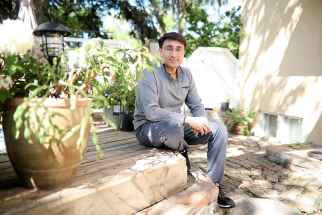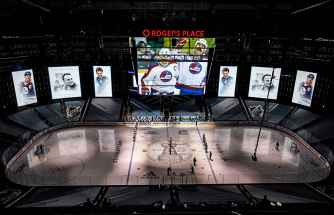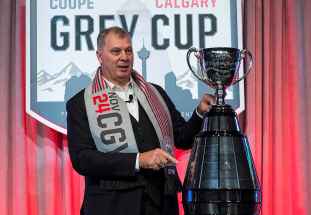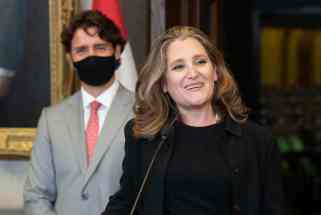Make no mistake, CFL commish has lots to learn If the league wants to get bigger, it first needs to get smarter
Read this article for free:
or
Already have an account? Log in here »
To continue reading, please subscribe:
Monthly Digital Subscription
$0 for the first 4 weeks*
- Enjoy unlimited reading on winnipegfreepress.com
- Read the E-Edition, our digital replica newspaper
- Access News Break, our award-winning app
- Play interactive puzzles
*No charge for 4 weeks then price increases to the regular rate of $19.00 plus GST every four weeks. Offer available to new and qualified returning subscribers only. Cancel any time.
Monthly Digital Subscription
$4.75/week*
- Enjoy unlimited reading on winnipegfreepress.com
- Read the E-Edition, our digital replica newspaper
- Access News Break, our award-winning app
- Play interactive puzzles
*Billed as $19 plus GST every four weeks. Cancel any time.
To continue reading, please subscribe:
Add Free Press access to your Brandon Sun subscription for only an additional
$1 for the first 4 weeks*
*Your next subscription payment will increase by $1.00 and you will be charged $16.99 plus GST for four weeks. After four weeks, your payment will increase to $23.99 plus GST every four weeks.
Read unlimited articles for free today:
or
Already have an account? Log in here »
Hey there, time traveller!
This article was published 18/08/2020 (1938 days ago), so information in it may no longer be current.
Monday was a day of mourning for the Canadian Football League and its fans after the 2020 season was officially cancelled owing to the COVID-19 pandemic. The decision was as much the right choice as it was the inevitable one, but that didn’t make the news any easier to swallow.
Through all of the doom and gloom, though, there may be light at the end of this dark tunnel. According to CFL commissioner Randy Ambrosie, who addressed reporters in a nationwide conference call Monday that allowed for just 25 minutes of his time and no follow-up questions, there are better days ahead.
The future, Ambrosie insisted, will be bigger and brighter than ever before.
At one point, the commissioner even made the bold proclamation that the CFL won’t just rebound from the reeling effects of the pandemic, but that the league is also eager to resume its efforts in becoming “the biggest global football league in the world.”
It was at this point of the chinwag that my eyes began to roll to the back of my head and I started to fear the worst.
It’s not that I don’t understand Ambrosie’s constant glass-is-half-full approach to doing business. He’s as much as salesman as he is the gatekeeper for the league, so putting on a strong face during troubling times is part of the job.
My fear is that it sounds all too familiar.
The fact is that Ambrosie was selling the same things before the coronavirus temporarily shut down professional sports in mid-March that he is now, only this time the CFL is in shambles and bleeding even more cash.

In his annual state-of-the-union address during Grey Cup week last November, Ambrosie said he wasn’t going to apologize for thinking big things for the CFL. Meanwhile, as we would later find out, the CFL lost $20 million in 2019 — at a time when COVID-19 wasn’t a contributing factor to the bottom line.
I did feel some hope, however, when Ambrosie was asked about his role in all this. Though at times in recent months he resembled more of a bear in hibernation than the ultimate leader of his pack, at least he didn’t deflect blame and even vowed to learn from his own mistakes.
“I’ve never met a leader I respect that doesn’t take responsibility when things don’t go well,” he said. “I have looked back on how this all unfolded, and there are things that I would like to have done differently. You try to learn from those things and move on.”
In order for the CFL to move on, and if the goal is to come back stronger — or at all, for that matter — there are certainly a few lessons to be taken away from the past four months.
So, where do we go from here?
The first is the obvious need to repair the relationship between the players and the league. I imagine somewhere in all the pain and anguish of a lost season there was a quiet, collective sense of relief coming from both sides, if only because it meant there would be a temporary break from what’s been a strenuous battle over a revised collective bargaining agreement for this year.
In his annual state-of-the-union address during Grey Cup week last November, Ambrosie said he wasn’t going to apologize for thinking big things for the CFL. Meanwhile, as we would later find out, the CFL lost $20 million in 2019 – at a time when COVID-19 wasn’t a contributing factor to the bottom line.
Throughout that process, Ambrosie, as well as the board of governors with whom he represents, sent a clear message to the players that they matter little in the grand scheme of things. While other sport leagues such as the NHL, NBA and MLB worked closely with players’ associations from the beginning to come up with a solution to put on games amid the coronavirus, the CFL dragged its feet in creating a unified front with one of its biggest stakeholders. Meetings were cancelled without explanation by the CFL and meaningful discussions didn’t begin in earnest until it was almost too late.
Just consider that Ambrosie, while trying to convince the federal government in May why the CFL needed as much as $150 million in the event of a lost season, was chastised by a number of MPs for not having consulted the players in his proposal. The truth is the players weren’t invited because they weren’t expected to benefit from it. Had the league planned to pay the players with any of the bailout money they were requesting, surely, one would think, the players would have been made aware of such a gesture.
It’s hard to predict the fallout of all this when it comes to the players. Careers in pro football are not long and for some who have already carved out years in the league, this will mean the end of the road. Others might choose not to return because of the way they were treated by their employer. Reputations matter and players talk.
The other glaring lesson the CFL should take from this is the benefit of being more transparent.
But where a lack of transparency really bit the CFL was in not revealing its financials. Those numbers, of course, are mostly hidden. While community-owned teams release their yearly financial reports (even those reports are questionable as far as detailed spending), the league and the privately owned clubs have no obligation to do the same.
The league has always found ways to shut out fans while also claiming uniqueness for how accessible it is. Player contracts are private. There’s a negotiation list of players for each team that people know little about. Teams aren’t afraid to lie about roster moves and walk-through depth charts ahead of games, without so much as a peep from league officials.
But where a lack of transparency really bit the CFL was in not revealing its financials. Those numbers, of course, are mostly hidden. While community-owned teams release their yearly financial reports (even those reports are questionable as far as detailed spending), the league and the privately owned clubs have no obligation to do the same.
Under normal circumstances I wouldn’t expect those teams and the league to pull back the curtains on their bank account. But when you’re asking for taxpayer money and claiming you deserve it because of how important you are to Canadians, perhaps it’s a smart idea for those you’re taking from to have an idea of how bad you need it.
Further, the CFL was denied a $30-million interest-free loan last week not because the government didn’t want to help them out. It was denied the loan because the CFL wanted to dictate the terms of a loan they would struggle mightily to pay back.
Ambrosie has spoken a number of times over the last few months about the opportunity to rethink the league’s business model. Clearly, given his continued goal for the league to attain international acclaim, he has no plans to abandon CFL 2.0. Big markets with small audiences such as Toronto and B.C. aren’t going to suddenly be popular.
So maybe the plan isn’t to be bigger but to spend within your means. Ideas such as capping coach and player salaries have been suggested. Others have opined a need for one single owner or to institute revenue sharing among the nine teams.
Whatever the options might be, if the CFL wants to get bigger it first needs to get smarter. And smart people don’t make the same mistakes over and over.
jeff.hamilton@freepress.mb.ca
Twitter: @jeffkhamilton

Jeff Hamilton
Multimedia producer
After a slew of injuries playing hockey that included breaks to the wrist, arm, and collar bone; a tear of the medial collateral ligament in both knees; as well as a collapsed lung, Jeff figured it was a good idea to take his interest in sports off the ice and in to the classroom.
Our newsroom depends on a growing audience of readers to power our journalism. If you are not a paid reader, please consider becoming a subscriber.
Our newsroom depends on its audience of readers to power our journalism. Thank you for your support.














